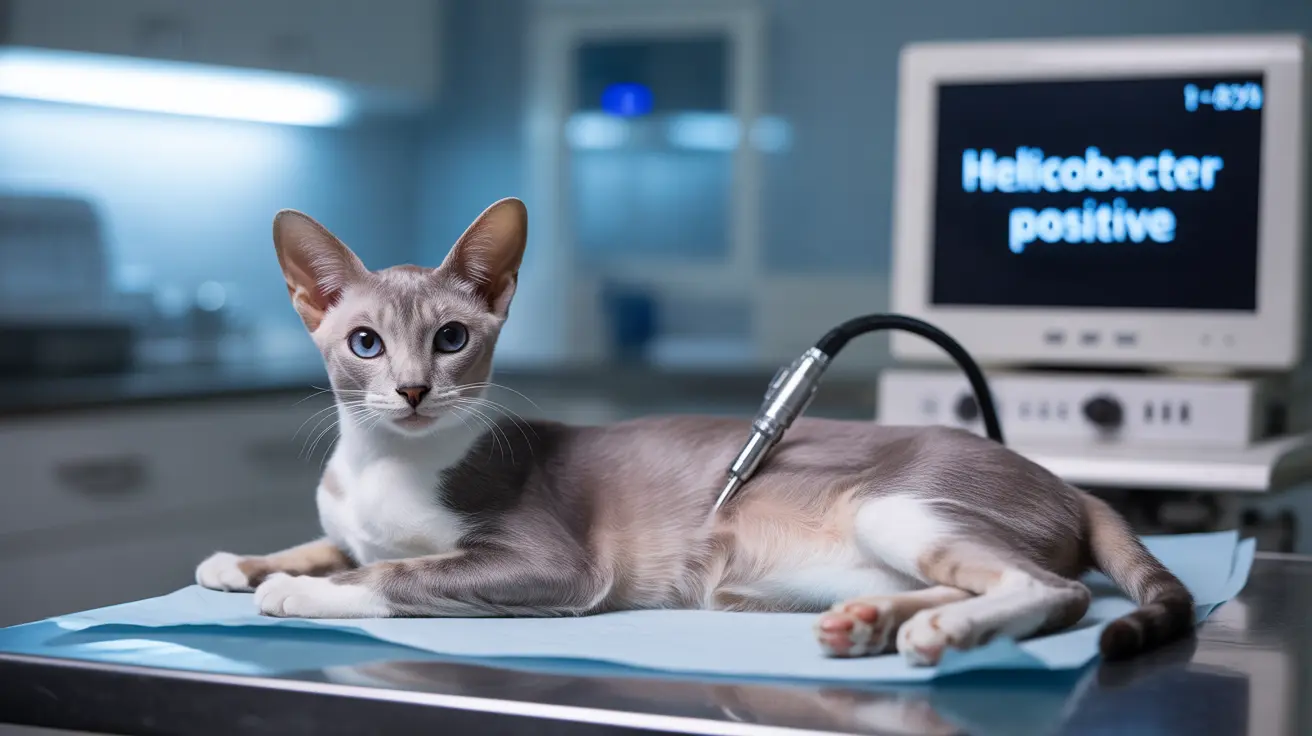If you've ever wondered about stomach infections in cats, Helicobacter pylori (H. pylori) and related bacterial species are fascinating yet often misunderstood conditions that affect our feline friends. While H. pylori itself is relatively rare in cats, various Helicobacter species commonly colonize feline stomachs, potentially impacting their digestive health.
Understanding these infections is crucial for cat owners, as they can occasionally cause concerning symptoms and require veterinary attention. Let's explore everything you need to know about H. pylori and related Helicobacter infections in cats, from symptoms to treatment options.
Common Helicobacter Species in Cats
While H. pylori is the most well-known species in humans, cats typically harbor different Helicobacter species. The most common are Helicobacter felis and Helicobacter heilmannii. Surprisingly, studies show that up to 100% of healthy cats may carry these bacteria in their stomach lining without showing any signs of illness.
Unlike H. pylori in humans, these feline-specific bacteria rarely cause severe disease, suggesting a more balanced relationship between cats and their bacterial residents.
Recognizing the Signs of Infection
Most cats with Helicobacter bacteria show no symptoms at all. However, when symptoms do occur, they typically include:
- Chronic vomiting
- Decreased appetite
- Weight loss
- Lethargy
- Abdominal discomfort
- Diarrhea
These symptoms usually only appear when the infection is significant or when other underlying health issues are present.
Diagnosis and Testing Methods
Veterinarians use several methods to diagnose Helicobacter infections in cats. The most definitive approach involves taking stomach biopsies through endoscopy, allowing direct visualization of the bacteria and assessment of stomach inflammation.
Other diagnostic tools may include:
- Specialized staining techniques
- PCR testing
- Rapid urease tests
- Blood tests to check for overall health status
Treatment Approaches
Treatment for Helicobacter infections in cats differs significantly from human protocols. Since most cats remain healthy despite carrying these bacteria, treatment is typically only recommended when significant symptoms are present.
When treatment is necessary, it usually involves a combination of:
- Antibiotics (usually two different types)
- Acid-suppressing medications
- Protective stomach medications
- Supportive care for symptoms
Treatment typically lasts 2-4 weeks, though some cats may require longer courses of therapy.
Prevention and Management
While completely preventing Helicobacter infection may be difficult, certain measures can help reduce exposure and manage symptoms:
- Regular cleaning of food and water bowls
- Maintaining good hygiene in litter box areas
- Prompt veterinary care when symptoms appear
- Regular health check-ups
- Stress reduction in multi-cat households
Frequently Asked Questions
Can cats pass H. pylori infection to humans, and is it safe to live with an infected cat?
While theoretical transmission is possible, there's no strong evidence that cats commonly pass Helicobacter infections to humans. It's generally safe to live with an infected cat, but maintaining good hygiene practices is always recommended.
What are the most common symptoms of Helicobacter infection in cats and when should I take my cat to the vet?
Common symptoms include chronic vomiting, decreased appetite, and weight loss. Consult a veterinarian if your cat shows persistent gastrointestinal symptoms lasting more than a few days or appears lethargic and uncomfortable.
How is Helicobacter infection diagnosed and treated in cats, and what is the typical recovery outlook?
Diagnosis typically requires endoscopy and biopsy. Treatment involves antibiotics and stomach medications. Most cats respond well to treatment, though complete elimination of the bacteria isn't always necessary or possible.
Are all cats with Helicobacter bacteria in their stomach sick, or do some remain healthy? Is treatment always needed?
Most cats with Helicobacter remain healthy and don't require treatment. Treatment is only necessary when cats show persistent symptoms or have confirmed gastritis.
What are the best ways to prevent Helicobacter infection in multi-cat households or shelters?
Prevention focuses on maintaining clean living conditions, regular sanitization of food and water bowls, proper litter box hygiene, and prompt treatment of any sick cats to prevent spread within the household.
Conclusion
While H. pylori and related Helicobacter infections are common in cats, they rarely cause serious problems. Understanding when to seek veterinary care and knowing that most cats can live harmoniously with these bacteria can help owners make informed decisions about their pet's health.






